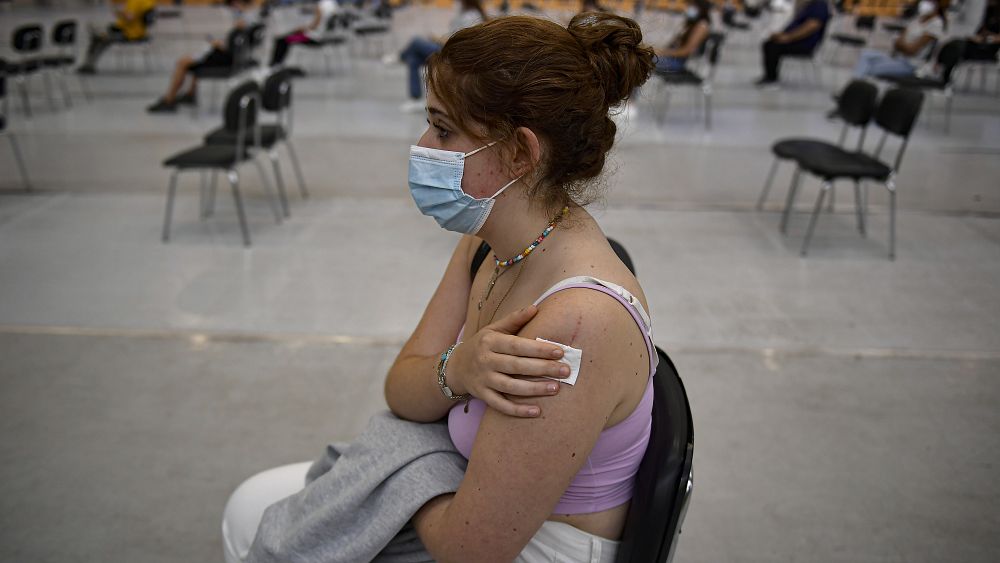
The European Union has ended its legal dispute with AstraZeneca, announcing a deal to secure the delivery of the remaining doses of the company’s COVID-19 vaccine to EU countries.
AstraZeneca committed to providing 135 million doses by the end of 2021 with the remaining 65 million doses delivered by the end of March 2022. That’s in addition to the almost 100 million already distributed throughout this year.
In total, the company will provide the bloc with 300 million doses – the figure initially agreed when it signed the contract with the European Commission in August 2020.
“Today’s settlement agreement guarantees the delivery of the remaining 200 million COVID-19 vaccine doses by AstraZeneca to the EU,” said Stella Kyriakides, EU Commissioner for health, in a statement.
“While this week we reached the important milestone of 70% full vaccination of the EU’s adult population, there are significant differences in vaccination rates between our Member States, and the continued availability of vaccines, including AstraZeneca’s, remain crucial.”
Portugal, Malta and Spain are leading the EU’s vaccination campaign, with more than 78% of their population partially vaccinated. But the inoculation rate drops to 27% and 16% in Romania and Bulgaria, respectively, creating a vast West-East divide.
Kyriakides also stressed the EU’s commitment to donate at least 200 million doses through COVAX to low- and middle-income countries.
AstraZeneca’s constant delays and their negative impact on the company’s reputation have pushed member states to rely more heavily on Pfizer-BioNTech and Moderna for their vaccine roll-outs. This shift has left many EU Countries with a considerable stock of unused AstraZeneca doses.
According to data from the European Centre for Disease Prevention and Control, France has so far administered 75.1% of its purchased doses of the AstraZeneca vaccine, formally known as Vaxzevria. The uptake rate falls to 51.8% in Austria, 44% in Greece and 32.8% in Slovenia.
As part of the settlement agreement announced on Friday, the EU will also end their legal dispute over the supply delays. The Commission had launched legal proceedings against AstraZeneca over breach of contract on 21 April. The first public hearing took place in Brussels the following month.
“I’m very pleased that we have been able to reach a common understanding which allows us to move forward and work in collaboration with the European Commission to help overcome the pandemic,” Ruud Dobber, Executive Vice President at the biopharmaceuticals business unit of AstraZeneca, said in a statement.
The agreement foresees capped rebates on the cost of each dose in the event that AstraZeneca fails to abide by the new timeframe: 10% for one month of delay, 25% for two months and 40% for three months or more. The rebates will not apply if the production problems are “beyond the reasonable control” of the company.
No love lost
The relation between the European Union and AstraZeneca soured shortly after the bloc began its vaccine rollout at the end of December.
The company had developed the vaccine in partnership with the University of Oxford using viral vector technology. This technique uses a modified version of a different virus (the vector) to deliver important instructions to the human cells with the aim of stimulating immunity.
The Anglo-Swedish multinational touted its shots as an affordable and easy-to-handle alternative to the ones manufactured by Pfizer-BioNTech and Moderna, which rely on complex mRNA technology and require ultra-cold storage. By contrast, the AstraZeneca jab can be stored inside normal refrigerators at temperatures between 2 to 8 degrees Celsius.
An excel sheet accidentally leaked last year by a Belgian official revealed the Commission was supposed to pay €1.78 per AstraZeneca dose, an important difference compared to the €12 price tag negotiated with Pfizer-BioNTech. This made the vaccine an attractive option for budget-conscious EU countries, like Bulgaria, Croatia and the Netherlands.
But, from very early on, it became clear that AstraZeneca was struggling to meet its promised schedule of deliveries for the first quarter of 2021, which totalled 90 million doses. The company made several announcements in January cutting its targets all the way down to 30 million doses.
The news infuriated Brussels and caused dismay among national governments, who had planned the first phase of their inoculation campaign around the AstraZeneca and Pfizer vaccines. Soon, officials were publicly accusing the company of sending doses manufactured in EU-based plants to the United Kingdom, much to the detriment of the European Union.
Under enormous political pressure, the Commission introduced an export control mechanism to heighten scrutiny over vaccine production inside the bloc, a move that was widely seen as a forceful attempt to redirect AstraZeneca doses towards EU countries. Weeks later, Italy blocked a shipment of 250,000 doses destined for Australia.
The AstraZeneca distribution suffered another setback when many European countries decided to stop using the vaccine in order to investigate very rare cases of blood clots. The European Medicines Agency later found a “possible link” between the AstraZeneca product and the medical condition but insisted that benefits from using the vaccine continued to outweigh risks.
While most EU countries gradually resumed the administration of the AstraZeneca shot, new age limitations and a litany of unfavourable headlines inevitably damaged the vaccine’s reputation across the continent. Some patients reportedly turned down the AstraZeneca product and demanded a second choice.
The comments made by French President Emmanuel Macron, who called the vaccine “quasi-ineffective” on people older than 65, dealt another blow to the company’s public image.
However, despite the intense scrutiny from politicians and media, AstraZeneca failed to speed up deliveries and compensate for delays. Under fire, the company defended itself, arguing the process of vaccine production is long and complex and cannot be easily accelerated.
The Commission had launched legal action against AstraZeneca on 21 April and while court appointments were expected in September, these are now cancelled as a result of Friday’s agreement.